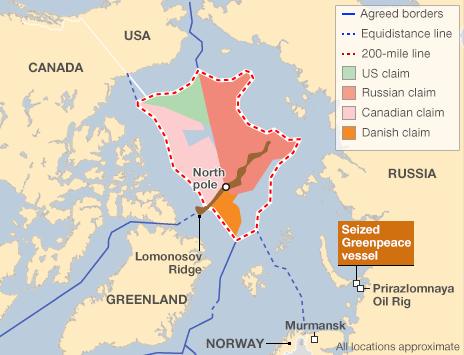Russia accuses Greenpeace crew of 'piracy' in Arctic
- Published
The BBC's Daniel Sandford: "This is the first time that Greenpeace have found themselves at the criminal end of the piracy law"
Russian prosecutors have accused 30 Greenpeace activists of piracy and say they will prosecute all of them for trying to board an Arctic oil platform.
Russia's Investigative Committee, modelled on the FBI, will question the activists. Six Britons are among them.
Their ship, the Arctic Sunrise, is being towed to the port of Murmansk.
Committee spokesman Vladimir Markin said "all those who assaulted the platform, regardless of nationality, will be prosecuted".
The campaigners were detained on Thursday along with their ship after two Greenpeace activists tried to climb onto a Gazprom offshore platform, in a protest against oil drilling in the Arctic.
The ship was raided by armed Russian men in balaclavas who abseiled down from helicopters. The ship was seized in the Pechora Sea, near the rig.
Greenpeace said the Russian authorities "are holding 30 of our activists".
Legal dispute
In a statement on Tuesday, Greenpeace said its ship had arrived in a fjord near Murmansk accompanied by a tug boat and the Russian Coast Guard vessel Ladoga.
"Greenpeace International lawyers are demanding immediate access to the 30 activists who have been held for over four days without legal or consular assistance. It is still not known whether Russia intends to lay formal charges and Greenpeace has not received any formal contact from the authorities," it said.
The environmental organisation said its protest against "dangerous Arctic oil drilling" was peaceful and in line with its "strong principles".
"Our activists did nothing to warrant the reaction we've seen from the Russian authorities," it said.
The campaigners on the ship are from 18 countries, including Australia, Brazil, Canada, Denmark, France, New Zealand, Russia, the UK and the US, Greenpeace said.

Mr Markin described the protest as "an attempt to seize a drilling platform by storm" and said it raised "legitimate doubts about their intentions". The ship "was loaded with electronics whose purpose was not clear", he said.
"It's hard to believe that the so-called activists did not know that the platform is an installation with a high hazard level, and any unauthorised actions on it can lead to an accident, which would not only endanger the people aboard it but also the ecology, which is being protected zealously," he said.
Article 227 of Russia's penal code defines piracy as "an attack on a ship at sea or on a river, with the aim of seizing someone else's property, using violence or the threat of violence". It can be punished with a jail term of up to 15 years, depending on the gravity of the offence, and a fine of up to 500,000 roubles (£10,000; $15,000).
British messages
Commenting on the Arctic campaigners, a Greenpeace spokesman said that "as far as we are aware they are in fairly good spirits and no-one has been ill-treated".
A British campaigner, Alex Harris, has texted her parents from the ship, saying she is "safe". "Will call when I can. Individuals have not been charged. Just the ship," she added in the message.
Earlier Sue Turner, mother of British campaigner Iain Rogers from Exeter in Devon, said: "I've been told they are being treated well by the Russians - I am very relieved".
Anthony Perrett, another British Greenpeace activist on the ship, spoke to his partner Zaharah Ally via a consulate telephone.
Ms Ally, from Newport in south Wales, said he told her that they were not allowed to leave the ship.
"However, they are allowed to move around the ship and conduct their daily lives," she told the BBC. "Anthony is a very positive person and sounded very well. He did say he would possibly be on the ship for five days."
- Published24 September 2013
- Published20 September 2013
- Published18 September 2013
- Published23 September 2013